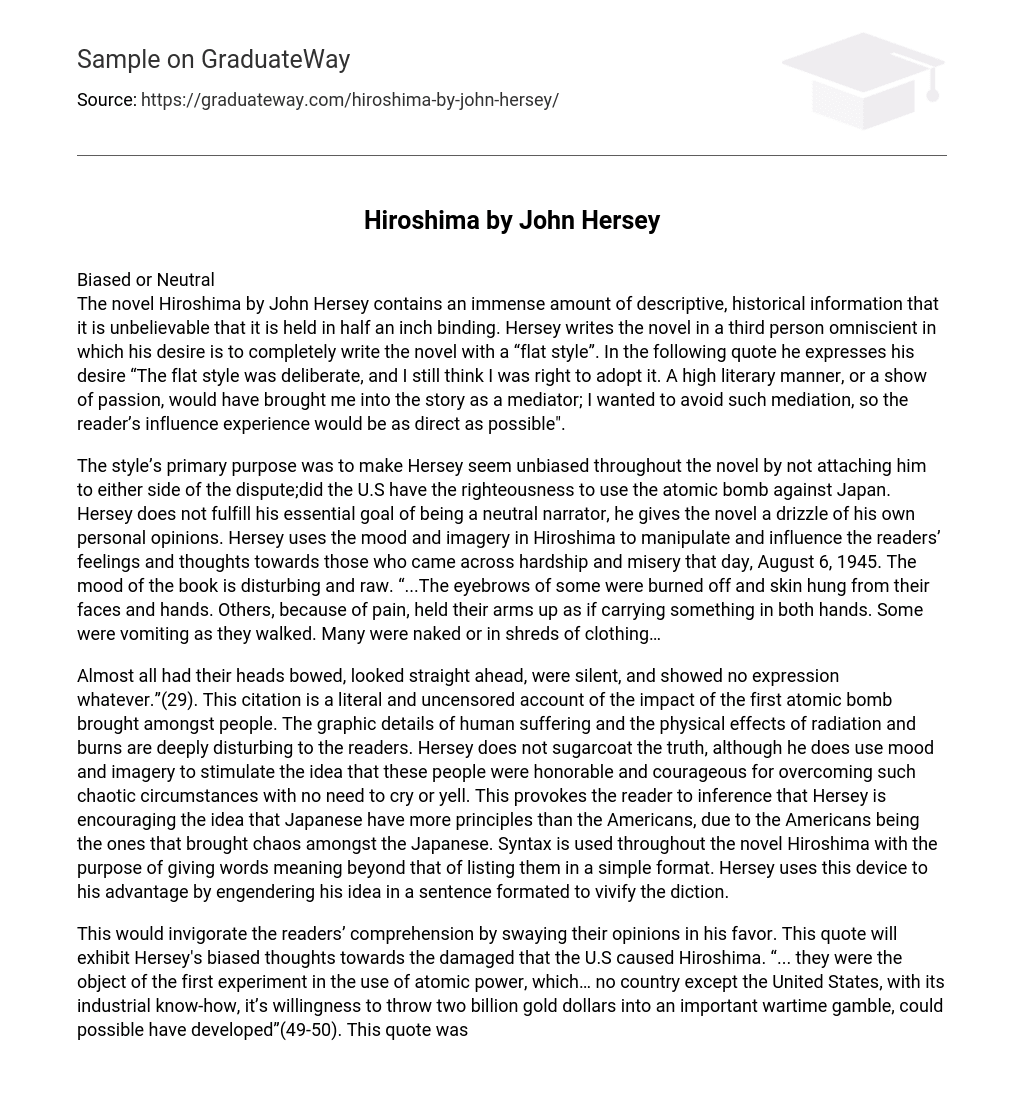The novel Hiroshima by John Hersey contains an immense amount of descriptive, historical information that it is unbelievable that it is held in half an inch binding. Hersey writes the novel in a third person omniscient in which his desire is to completely write the novel with a “flat style”. In the following quote he expresses his desire “The flat style was deliberate, and I still think I was right to adopt it. A high literary manner, or a show of passion, would have brought me into the story as a mediator; I wanted to avoid such mediation, so the reader’s influence experience would be as direct as possible”.
The style’s primary purpose was to make Hersey seem unbiased throughout the novel by not attaching him to either side of the dispute;did the U.S have the righteousness to use the atomic bomb against Japan. Hersey does not fulfill his essential goal of being a neutral narrator, he gives the novel a drizzle of his own personal opinions. Hersey uses the mood and imagery in Hiroshima to manipulate and influence the readers’ feelings and thoughts towards those who came across hardship and misery that day, August 6, 1945. The mood of the book is disturbing and raw. “… The eyebrows of some were burned off and skin hung from their faces and hands. Others, because of pain, held their arms up as if carrying something in both hands. Some were vomiting as they walked. Many were naked or in shreds of clothing…
Almost all had their heads bowed, looked straight ahead, were silent, and showed no expression whatever.”(29). This citation is a literal and an uncensored account of the impact of the first atomic bomb brought amongst people. The graphic details of human suffering and the physical effects of radiation and burns are deeply disturbing to the readers. Hersey does not sugarcoat the truth, although he does use mood and imagery to stimulate the idea that these people were honorable and courageous for overcoming such chaotic circumstances with no need to cry or yell. This provokes the reader to infer that Hersey is encouraging the idea that Japanese have more principles than the Americans, due to the Americans being the ones that brought chaos amongst the Japanese. The syntax is used throughout the novel Hiroshima with the purpose of giving words meaning beyond that listing them in a simple format. Hersey uses this device to his advantage by engendering his idea in a sentence formulated to vivify the diction.
This would invigorate the readers’ comprehension by swaying their opinions in his favor. This quote will exhibit Hersey’s biased thoughts towards the damaged that the U.S caused Hiroshima. “… They were the object of the first experiment in the use of atomic power, which… no country except the United States, with its industrial know-how, its willingness to throw two billion gold dollars into an important wartime gamble, could possibly have developed”(49-50). This quote was created upon Hersey’s beliefs, not facts, this signals his animosity in the United States. The format of this quote uses denotation; emphasizing the true meaning of the adjective such as in “gold dollars”. Hersey stresses how valuable money is in order to make the point that the United States thoughtlessly spent two billion dollars. Hersey also seems to use sarcasm in Hiroshima, sarcasm’s purpose is to make the subject or character seem cynical.
The quote below incites that the Japanese did not want to be held guilty for the disaster and the chaos that the United States brought amongst those present that dreadful day. “… apparently because the Japanese government did not want to be saddled with anything like the moral responsibility for the heinous acts of the victorious United States.”(92). In the tone of this sentence the adjective “victorious” jumps from the page and creates an idea of Hersey reading the sentence repeatedly, laughing at the irony of victory being produced from disaster and misery. This citation concludes that Hersey improvised his facts, suggesting that Japan was irresponsible and that the United States provoked the situation just to claim infamous victory.
To be able to comprehend John Hersey’s biased reasoning, his background is necessary. John Hersey the son of two missionaries, was born in China on June seventeenth and lived there until the age of ten, then he moved to the United States. Hersey spoke fluent Chinese and was influenced by the culture. This band made him feel a connection with Hiroshima, he sensed that it could have been his hometown in China the one struck by the bomb. With this in mind, the logic of his biased reasoning towards Hiroshima is explicit because “Home is where the heart is”(Pliny the Elder). Although Hersey has his personal reasons why he is biased, he did not overcome his opinions failing at writing the novel Hiroshima in a neutral way, and indeed being a mediator.





